On Freedom by Kahlil Gibran

And an orator said, Speak to us of Free-
dom.
And he answered:
At the city gate and by your fireside I
have seen you prostrate yourself and worship
your own freedom,
Even as slaves humble themselves before
a tyrant and praise him though he slays
Read Poem dom.
And he answered:
At the city gate and by your fireside I
have seen you prostrate yourself and worship
your own freedom,
Even as slaves humble themselves before
a tyrant and praise him though he slays
0
Slavery by Hannah More

If Heaven has into being deigned to call
Thy light, O Liberty! to shine on all;
Bright intellectual Sun! why does thy ray
To earth distribute only partial day?
Since no resisting cause from spirit flows
Thy universal presence to oppose;
No obstacles by Nature’s hand impressed,
Thy subtle and ethereal beams arrest;
Read Poem Thy light, O Liberty! to shine on all;
Bright intellectual Sun! why does thy ray
To earth distribute only partial day?
Since no resisting cause from spirit flows
Thy universal presence to oppose;
No obstacles by Nature’s hand impressed,
Thy subtle and ethereal beams arrest;
0
The Drum Major of the Freedom Parade by Margaret Burroughs
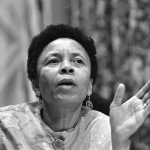
(For all children who wondered about the tragic event of April 4, 1968 at Memphis.)
My children, my children, remember the day
When the Drum Major of Freedom's parade went away.
Stop crying now little children and listen
And you will know for the future what really did happen.
You will know why your father was solemn and grim
And why mother's eyes were wet at the rim.
You will know why the flags flew at half mast
Read Poem When the Drum Major of Freedom's parade went away.
Stop crying now little children and listen
And you will know for the future what really did happen.
You will know why your father was solemn and grim
And why mother's eyes were wet at the rim.
You will know why the flags flew at half mast
0
Freedom by Langston Hughes
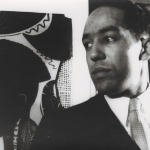
Freedom will not come
Today, this year
Nor ever
Through compromise and fear.
I have as much right
As the other fellow has
To stand
On my two feet
Read Poem Today, this year
Nor ever
Through compromise and fear.
I have as much right
As the other fellow has
To stand
On my two feet
0
Haiku and Tanka for Harriet Tubman by Sonia Sanchez

1
Picture a woman
riding thunder on
the legs of slavery ...
2
Picture her kissing
our spines saying no to
the eyes of slavery ...
Read Poem Picture a woman
riding thunder on
the legs of slavery ...
2
Picture her kissing
our spines saying no to
the eyes of slavery ...
0
Lincoln by Henrietta Cordelia Ray

To-day, O martyred chief, beneath the sun
We would unveil thy form; to thee who won
Th’applause of nations for thy soul sincere,
A loving tribute we would offer here.
’T was thine not worlds to conquer, but men’s hearts;
To change to balm the sting of slavery’s darts;
In lowly charity thy joy to find,
And open “gates of mercy on mankind.”
And so they come, the freed, with grateful gift,
From whose sad path the shadows thou didst lift.
Eleven years have rolled their seasons round,
Since its most tragic close thy life-work found.
Yet through the vistas of the vanished days
We see thee still, responsive to our gaze,
Read Poem We would unveil thy form; to thee who won
Th’applause of nations for thy soul sincere,
A loving tribute we would offer here.
’T was thine not worlds to conquer, but men’s hearts;
To change to balm the sting of slavery’s darts;
In lowly charity thy joy to find,
And open “gates of mercy on mankind.”
And so they come, the freed, with grateful gift,
From whose sad path the shadows thou didst lift.
Eleven years have rolled their seasons round,
Since its most tragic close thy life-work found.
Yet through the vistas of the vanished days
We see thee still, responsive to our gaze,
0
The Nineteenth of April by Lucy Larcom

This year, till late in April, the snow fell thick and light:
Thy truce-flag, friendly Nature, in clinging drifts of white,
Hung over field and city: now everywhere is seen,
In place of that white quietness, a sudden glow of green.
The verdure climbs the Common, beneath the leafless trees,
To where the glorious Stars and Stripes are floating on the breeze.
There, suddenly as Spring awoke from Winter’s snow-draped gloom,
The Passion-Flower of Seventy-six is bursting into bloom.
Dear is the time of roses, when earth to joy is wed,
And garden-plot and meadow wear one generous flush of red;
But now in dearer beauty, to her ancient colors true,
Blooms the old town of Boston in red and white and blue.
Read Poem Thy truce-flag, friendly Nature, in clinging drifts of white,
Hung over field and city: now everywhere is seen,
In place of that white quietness, a sudden glow of green.
The verdure climbs the Common, beneath the leafless trees,
To where the glorious Stars and Stripes are floating on the breeze.
There, suddenly as Spring awoke from Winter’s snow-draped gloom,
The Passion-Flower of Seventy-six is bursting into bloom.
Dear is the time of roses, when earth to joy is wed,
And garden-plot and meadow wear one generous flush of red;
But now in dearer beauty, to her ancient colors true,
Blooms the old town of Boston in red and white and blue.
0
On Pleasure by Kahlil Gibran

Then a hermit, who visited the city once
a year, came forth and said, Speak to us of
Pleasure.
And he answered, saying:
Pleasure is a freedom-song,
But it is not freedom.
It is the blossoming of your desires,
But it is not their fruit.
Read Poem a year, came forth and said, Speak to us of
Pleasure.
And he answered, saying:
Pleasure is a freedom-song,
But it is not freedom.
It is the blossoming of your desires,
But it is not their fruit.
0
The Black Regiment by George Henry Boker

Dark as the clouds of even,
Ranked in the western heaven,
Waiting the breath that lifts
All the dread mass, and drifts
Tempest and falling brand
Over a ruined land;—
So still and orderly,
Arm to arm, knee to knee,
Waiting the great event,
Stands the Black Regiment.
Down the long dusky line
Teeth gleam and eyeballs shine;
And the bright bayonet,
Bristling and firmly set,
Read Poem Ranked in the western heaven,
Waiting the breath that lifts
All the dread mass, and drifts
Tempest and falling brand
Over a ruined land;—
So still and orderly,
Arm to arm, knee to knee,
Waiting the great event,
Stands the Black Regiment.
Down the long dusky line
Teeth gleam and eyeballs shine;
And the bright bayonet,
Bristling and firmly set,
0
To the Right Honorable William, Earl of Dartmouth by Phillis Wheatley
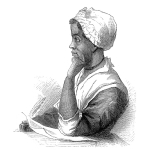
Hail, happy day, when, smiling like the morn,
Fair Freedom rose New-England to adorn:
The northern clime beneath her genial ray,
Dartmouth, congratulates thy blissful sway:
Elate with hope her race no longer mourns,
Each soul expands, each grateful bosom burns,
While in thine hand with pleasure we behold
The silken reins, and Freedom's charms unfold.
Read Poem Fair Freedom rose New-England to adorn:
The northern clime beneath her genial ray,
Dartmouth, congratulates thy blissful sway:
Elate with hope her race no longer mourns,
Each soul expands, each grateful bosom burns,
While in thine hand with pleasure we behold
The silken reins, and Freedom's charms unfold.
0
A Fable by Etheridge Knight
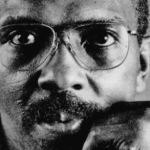
Once upon a today and yesterday and nevermore there were 7 men and women all locked / up in prison cells. Now these 7 men and women were innocent of any crimes; they were in prison because their skins were black. Day after day, the prisoners paced their cells, pining for their freedom. And the non-black jailers would laugh at the prisoners and beat them with sticks and throw their food on the floor. Finally, prisoner #1 said, “I will educate myself and emulate the non-colored people. That is the way to freedom—c’mon, you guys, and follow me.” “Hell, no,” said prisoner #2. “The only way to get free is to pray to my god and he will deliver you like he delivered Daniel from the lion’s den, so unite and follow me.” “Bullshit,” said prisoner #3. “The only way / out is thru this tunnel i’ve been quietly digging, so c’mon, and follow me.” “Uh-uh,” said prisoner #4, “that’s too risky. The only right / way is to follow all the rules and don’t make the non-colored people angry, so c’mon brothers and sisters and unite behind me.”“Fuck you!” said prisoner #5, “The only way / out is to shoot our way out, if all of you get / together behind me.” “No,” said prisoner #6, “all of you are incorrect; you have not analyzed the political situation by my scientific method and historical meemeejeebee. All we have to do is wait long enough and the bars will bend from their own inner rot. That is the only way.” “Are all of you crazy,” cried prisoner #7. “I’ll get out by myself, by ratting on the rest of you to the non-colored people. That is the way, that is the only way!” “No-no,” they / all cried, “come and follow me. I have the / way, the only way to freedom.” And so they argued, and to this day they are still arguing; and to this day they are still in their prison cells, their stomachs / trembling with fear.
Read Poem 0
My Country ’Tis of Thee by W. E. B. Du Bois
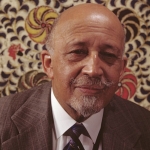
Of course you have faced the dilemma: it is announced, they all smirk and rise. If they are ultra, they remove their hats and look ecstatic; then they look at you. What shall you do? Noblesse oblige; you cannot be boorish, or ungracious; and too, after all it is your country and you do love its ideals if not all of its realities. Now, then, I have thought of a way out: Arise, gracefully remove your hat, and tilt your head. Then sing as follows, powerfully and with deep unction. They’ll hardly note the little changes and their feelings and your conscience will thus be saved:
My country tis of thee,
Late land of slavery,
Of thee I sing.
Land where my father’s pride
Slept where my mother died,
From every mountain side
Let freedom ring!
My native country thee
Land of the slave set free,
Thy fame I love.
I love thy rocks and rills
And o’er thy hate which chills,
Read Poem My country tis of thee,
Late land of slavery,
Of thee I sing.
Land where my father’s pride
Slept where my mother died,
From every mountain side
Let freedom ring!
My native country thee
Land of the slave set free,
Thy fame I love.
I love thy rocks and rills
And o’er thy hate which chills,
0
France: An Ode by Samuel Taylor Coleridge

I
Ye Clouds! that far above me float and pause,
Whose pathless march no mortal may control!
Ye Ocean-Waves! that, wheresoe'er ye roll,
Yield homage only to eternal laws!
Ye Woods! that listen to the night-birds singing,
Midway the smooth and perilous slope reclined.
Save when your own imperious branches swinging,
Read Poem Ye Clouds! that far above me float and pause,
Whose pathless march no mortal may control!
Ye Ocean-Waves! that, wheresoe'er ye roll,
Yield homage only to eternal laws!
Ye Woods! that listen to the night-birds singing,
Midway the smooth and perilous slope reclined.
Save when your own imperious branches swinging,
0
Ode, Inscribed to William H. Channing by Ralph Waldo Emerson
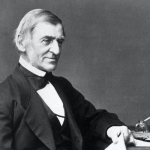
Though loath to grieve
The evil time's sole patriot,
I cannot leave
My honied thought
For the priest's cant,
Or statesman's rant.
If I refuse
My study for their politique,
Which at the best is trick,
The angry Muse
Puts confusion in my brain.
But who is he that prates
Of the culture of mankind,
Read Poem The evil time's sole patriot,
I cannot leave
My honied thought
For the priest's cant,
Or statesman's rant.
If I refuse
My study for their politique,
Which at the best is trick,
The angry Muse
Puts confusion in my brain.
But who is he that prates
Of the culture of mankind,
0
Underwear by Lawrence Ferlinghetti
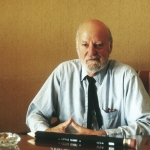
I didn’t get much sleep last night
thinking about underwear
Have you ever stopped to consider
underwear in the abstract
When you really dig into it
some shocking problems are raised
Underwear is something
we all have to deal with
Read Poem thinking about underwear
Have you ever stopped to consider
underwear in the abstract
When you really dig into it
some shocking problems are raised
Underwear is something
we all have to deal with
0
You Ask Me, Why, Tho' Ill at Ease by Alfred, Lord Tennyson

You ask me, why, tho' ill at ease,
Within this region I subsist,
Whose spirits falter in the mist,
And languish for the purple seas.
It is the land that freemen till,
That sober-suited Freedom chose,
The land, where girt with friends or foes
Read Poem Within this region I subsist,
Whose spirits falter in the mist,
And languish for the purple seas.
It is the land that freemen till,
That sober-suited Freedom chose,
The land, where girt with friends or foes
0
Let America Be America Again by Langston Hughes

Let America be America again.
Let it be the dream it used to be.
Let it be the pioneer on the plain
Seeking a home where he himself is free.
(America never was America to me.)
Let America be the dream the dreamers dreamed—
Let it be that great strong land of love
0
Something in the Belly by Deena Metzger
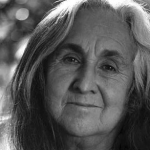
I wanted to have a poem and I was pregnant. I was very thin. As if I’d lived on air. A poet must be able to live on air, but a mother must not attempt it. My mother wanted me to buy a set of matching pots, Wearever aluminum, like the ones she had. They were heavy and had well fitting lids so my suppers wouldn’t burn. My husband wanted me to give dinner parties. John F. Kennedy was running for office.
I sensed danger. Kennedy wasn’t against the Bomb or for nuclear disarmament. I joined SANE at its inception. Also Concerned Scientists. I spoke with Linus Pauling and encouraged my husband to help his partner organize Physicians for Social Responsibility.
There was a baby in my belly. I wanted to write poems. I had a crazy idea that a woman could write a real novel, the kind that shook the world. I hallucinated that a woman could be a poet, but she would have to be free. I couldn’t imagine that freedom for myself even though I could see it in Isla Negra when I followed Pablo Neruda. I could see it in the way he walked. Even if he were walking inside a dictatorship, among guns, soldiers and spies, there was nothing between him and his vision. Anything he saw, he was able to take into himself–there was no sight, no image, no vision to which he didn’t feel entitled. In his heart, everything–everything–belonged to him. Pablo Neruda was–more than anything–a poet, and so he was an entitled man.
I was a woman and entitled to nothing. I had nothing except a husband, a rented house, a set of pots, living room furniture, a frenzy of obligations, credit cards, anxious relatives, too many acquaintances, a gift of future diaper service, two telephones, no time to read, a plastic wrapped cookbook of recipes gleaned from the pages of the New York Times, and a hunger, a terrible hunger for the unimaginable, unlimited freedom of being a poet, and a baby in my belly.
I would have called Pablo long distance if I had the courage, if I had the ability to speak Spanish fluently, if we had ever talked about real things. But, what would a man know about a baby in the belly? And what did it matter if there were to be one poet more or less in the world when so many in his country were dying?
I woke up one morning and thought–I can’t have this child. My husband said, “You’ll have to get a job after it’s born so we can buy a house. You’ll need an advanced degree so you can do something.” I thought, I can’t. I have to write poems. My mother found a crib. Someone painted it white. A friend sent a pastel mobile with tame wood animals. I thought about blue curtains, making bedspreads, and abortions.
Pablo was silent. He was walking so far from me, I couldn’t hear him. My husband objected to donating more free medical care to the Black Panthers. I tried to make dolmades from scratch and located grape leaves preserved in brine at the Boys’ Market twenty miles away. I organized a write-in campaign for peace to challenge JFK. My husband thought it would be nice to have teatime with the children and romantic dinners by ourselves. The new formula bottles lined up on the sink like tiny bombs. The U.S. was pursuing over ground testing; I was afraid the radiation would cross the milk barrier. I had a poem in me howling for real life but no language to write in. The fog came in thick, flapping about my feet like blankets unraveling. I became afraid to have a daughter.
I called Pablo Neruda in the middle of the night as he walked underwater by Isla Negra. He moved like a dream porpoise. He seemed pregnant with words. They came out of his penis in long miraculous strings. The sea creatures quivered with joy. I said, “Pablo, I want to know how to bear the child in my belly onto this bed of uranium and I want to know if a woman can a be a poet.” He was large as a whale. He drank the sea and spouted it in glistening odes, black and shiny. I said, “I can’t have this child,” and he laughed as if he had never done anything but carry and birth children.
Read Poem I sensed danger. Kennedy wasn’t against the Bomb or for nuclear disarmament. I joined SANE at its inception. Also Concerned Scientists. I spoke with Linus Pauling and encouraged my husband to help his partner organize Physicians for Social Responsibility.
There was a baby in my belly. I wanted to write poems. I had a crazy idea that a woman could write a real novel, the kind that shook the world. I hallucinated that a woman could be a poet, but she would have to be free. I couldn’t imagine that freedom for myself even though I could see it in Isla Negra when I followed Pablo Neruda. I could see it in the way he walked. Even if he were walking inside a dictatorship, among guns, soldiers and spies, there was nothing between him and his vision. Anything he saw, he was able to take into himself–there was no sight, no image, no vision to which he didn’t feel entitled. In his heart, everything–everything–belonged to him. Pablo Neruda was–more than anything–a poet, and so he was an entitled man.
I was a woman and entitled to nothing. I had nothing except a husband, a rented house, a set of pots, living room furniture, a frenzy of obligations, credit cards, anxious relatives, too many acquaintances, a gift of future diaper service, two telephones, no time to read, a plastic wrapped cookbook of recipes gleaned from the pages of the New York Times, and a hunger, a terrible hunger for the unimaginable, unlimited freedom of being a poet, and a baby in my belly.
I would have called Pablo long distance if I had the courage, if I had the ability to speak Spanish fluently, if we had ever talked about real things. But, what would a man know about a baby in the belly? And what did it matter if there were to be one poet more or less in the world when so many in his country were dying?
I woke up one morning and thought–I can’t have this child. My husband said, “You’ll have to get a job after it’s born so we can buy a house. You’ll need an advanced degree so you can do something.” I thought, I can’t. I have to write poems. My mother found a crib. Someone painted it white. A friend sent a pastel mobile with tame wood animals. I thought about blue curtains, making bedspreads, and abortions.
Pablo was silent. He was walking so far from me, I couldn’t hear him. My husband objected to donating more free medical care to the Black Panthers. I tried to make dolmades from scratch and located grape leaves preserved in brine at the Boys’ Market twenty miles away. I organized a write-in campaign for peace to challenge JFK. My husband thought it would be nice to have teatime with the children and romantic dinners by ourselves. The new formula bottles lined up on the sink like tiny bombs. The U.S. was pursuing over ground testing; I was afraid the radiation would cross the milk barrier. I had a poem in me howling for real life but no language to write in. The fog came in thick, flapping about my feet like blankets unraveling. I became afraid to have a daughter.
I called Pablo Neruda in the middle of the night as he walked underwater by Isla Negra. He moved like a dream porpoise. He seemed pregnant with words. They came out of his penis in long miraculous strings. The sea creatures quivered with joy. I said, “Pablo, I want to know how to bear the child in my belly onto this bed of uranium and I want to know if a woman can a be a poet.” He was large as a whale. He drank the sea and spouted it in glistening odes, black and shiny. I said, “I can’t have this child,” and he laughed as if he had never done anything but carry and birth children.
0
Didn't You Ever Search For Another Star? by Alfred Starr Hamilton

I.
did you say
August ponds
ought to have
been surrounded
by September fences?
but did you say
September fences
Read Poem did you say
August ponds
ought to have
been surrounded
by September fences?
but did you say
September fences
0
Maggid by Marge Piercy

The courage to let go of the door, the handle.
The courage to shed the familiar walls whose very
stains and leaks are comfortable as the little moles
of the upper arm; stains that recall a feast,
a child’s naughtiness, a loud blattering storm
that slapped the roof hard, pouring through.
Read Poem The courage to shed the familiar walls whose very
stains and leaks are comfortable as the little moles
of the upper arm; stains that recall a feast,
a child’s naughtiness, a loud blattering storm
that slapped the roof hard, pouring through.
0